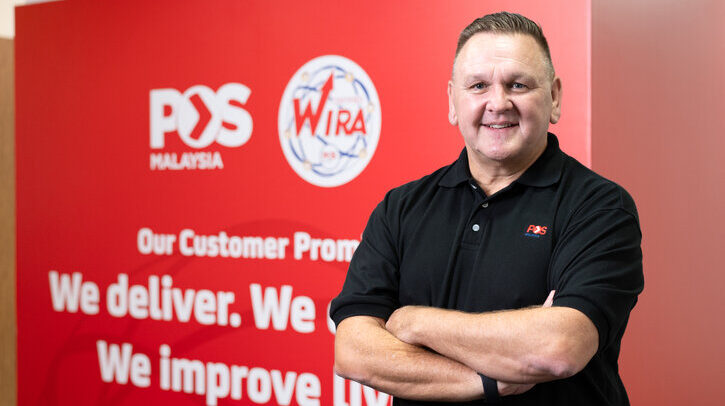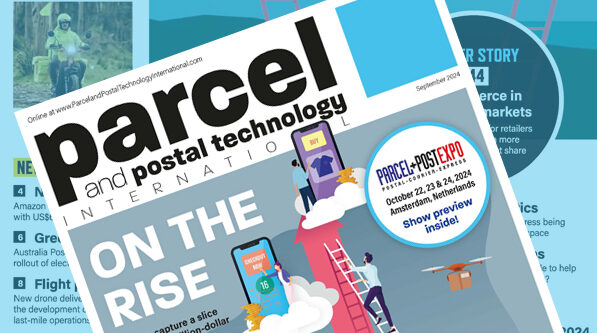With a history dating back more than 200 years, Pos Malaysia is one of the oldest companies operating in Southeast Asia. It has a sizeable workforce of more than 16,000 people and is undergoing a significant digital and sustainable transformation project, evolving from “a mail company that also delivers parcels to being a parcels company that also delivers mail”, according to the post’s group CEO, Charles Brewer.
As is the current global trend, Pos Malaysia has seen a steady decline in lettermail in recent years – between 7% and 8% a year according to Brewer – but it is still required as part of the universal service obligation to deliver to more than 11 million addresses across Malaysia every day. This, along with an increasingly competitive parcel market, has resulted in a clear need to diversify the service portfolio with the goal of delivering a sustainable and profitable fiscal position.
“We haven’t delivered a profit since 2019,” Brewer reveals. “However, we have managed to continually and successfully reduce the loss year over year by 11% in 2021, by 18% in 2022 and 51% in 2023 by tackling the low-hanging fruit opportunities, merging mail and parcel networks, driving up productivity and changing our business models, but we still have work to do.
“We’re incredibly diversified now. At our core is of course mail and parcel, but we also have Pos Aviation, which provides ‘above and below’ the wing services, including inflight catering – where we produce more than 11 million meals a day. We have a logistics division which, along with providing traditional 3PL supply chain solutions, also has two ships that carry coal to and from Indonesia. We have Pos Ar-Rahnu, which provides retail pawnbroking for gold, and we have Pos Digicert, which is rapidly growing to provide software-as-a-service and digital consulting solutions,” he continues.
Market challenges
The structural decline in lettermail is not the only challenge for Brewer when it comes to making Pos Malaysia profitable again – the saturation of the parcel market and the changing business models of the e-commerceplatforms also present challenges.
“Five years ago, there were only really a handful of domestic parcel operators in Malaysia and the online retailers for the most part outsourced everything they sold, but that has all changed. We have seen a rapid influx of foreign parcel carriers, funded by venture capital investments in the sector, using ‘rock-bottom’ pricing to gain market share and disrupt the incumbents. At the same time, we have seen the online platforms insource their logistics operation and use ‘masking’ to prevent the consumers from being able to select the carrier of choice,” Brewer confirms. “It really is a very difficult market at present and requires considerable regulatory intervention.”
He continues, “Consumers in Asia are incredibly digitally native, so online as a percentage of total retail is growing – and growing fast. At the same time, the Malaysian consumers expect deliveries to be delivered fast and with significantly greater visibility than in the past. It’s a very advanced environment.
“The market and consumers are changing quickly; the trick is to really listen to how customer demands are evolving and try to adapt your model accordingly to stay a few steps ahead.”
Dealing with inefficiency
Since becoming group CEO in 2021, Brewer has focused on transforming pretty much every part of the business. Starting with the customer journey, he and the team at Pos Malaysia have been rewriting the playbook – from organization, culture, service levels, customer segmentation and front-end systems to the costing and pricing, the company’s approach to sustainability and, of course, its fiscal position.
“For example, in one of my first weeks back in Malaysia and as part of my learning on the front line, I was in the Cameron Highlands accompanying one of our line-haul truck drivers as he worked his way up to the north of Malaysia dropping off pre-sorted mail for delivery. As we turned left to one of our mail delivery facilities, another Pos Malaysia truck in front of us turned right. I asked the driver where he was going, to which he replied, ‘To the parcel delivery facility, which is about 100m from the mail delivery facility.’
“We were running two completely separate networks which, in today’s world of declining mail volumes, just doesn’t make sense. So, over the past couple of years we’ve brought about 80% of our network together into a single system, which gives us a significantly lower cost of delivery, improves service levels and simplifies the network.
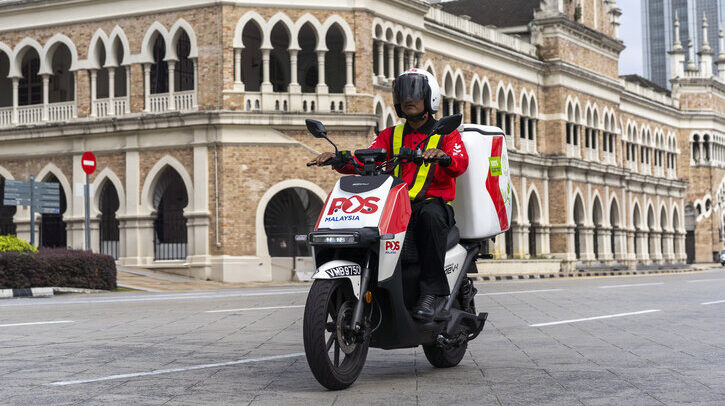
“We decided to merge the parcel network into our mail delivery fleet as much as we possibly could, given that we operate primarily via two-wheel vehicles. And on the back of those bikes we use big tubs for carrying mail; now, those tubs are used to carry 40-50 parcels weighing less than 2kg, which means we get a much lower cost of delivery and a far more efficient network,” Brewer adds.
Pos Malaysia is also investing in digitalization to improve the customer journey and reduce inefficiencies. “A key piece of our digitalization program is modernizing our stack. Now we have about 95% of our digital services in the cloud, which means we’re much more agile and deliver solutions faster and at a lower cost too,” Brewer explains.
“We have an amazing retail footprint and serve more than 1.5 million unique visitors per month. Three years ago – and because we were so manual – we had long queues and, as a result, unhappy customers. We’ve replaced that with a lot of technology and rebuilt in-house our point-of-sale system to improve the customer experience. And the great news is our NPS [net promoter score] for retail runs at plus 90, which is amazing!
“Our core operating system was also old, lacking modern tech features and expensive to maintain, so we have recently moved that across to a new system that provides first-, middle- and last-mile services as well as sorting operations and predictive delivery dates, etc. It has taken about seven months, and not without some transition pain, but is now delivering at a lower cost and creating value for our people and for our customers.”
Understanding demand
Surprisingly, the out-of-home (OOH) market is less of a focus for the postal operator right now, as consumer demand for parcel lockers in Malaysia isn’t as great as in other markets.
“When I came from Canada Post, which has thousands of parcel lockers, I anticipated a similar opportunity for Pos Malaysia but it isn’t a huge ask at the moment,” Brewer shares. “One of the few benefits to come out of Covid is that consumer expectations for home delivery have changed in Malaysia – recipients are now completely comfortable with us dropping the parcel, taking a picture [e-proof of delivery] and leaving. We’ve been able to speed up our delivery process by simply employing this knock, drop and go initiative, meaning we can keep up with parcel demands and reduce the need for second or third delivery attempts.”
However, that isn’t to say that Pos Malaysia won’t introduce OOH service offerings in the future, and the team stays abreast of developing global trends as well as where their customers are asking the organization to develop.
“I think we do a pretty good job across the management team of trying to stay conversant with what’s happening around the world. And we visit many other posts to understand what they’re doing – we’ve worked with SingPost, Correos in Spain, CTT in Portugal, Australia Post and La Poste in France recently, for example,” explains Brewer. “There are some things in Asia that sort of leapfrog what is happening in Western markets, but there are some things where we’re a few years behind, perhaps, so we try to keep our eye on everything.”
One technology that Pos Malaysia has yet to deploy is self-service in retail, which Brewer believes will become more relevant eventually. “While today it isn’t a top priority, we do believe it will become more relevant along with other digital tools, such as use of AI, in both our traditional retail activities and possibly more urgently in our rapidly growing convenience stores – Pos Shop,” he confirms.
The same applies to the very many robotic solutions that exist today – labor costs in Malaysia remain low, so trying to establish sensible return on investment (ROI) can be challenging, according to Brewer. “We already use mainstream sort technology and automation in our hubs and are rapidly accelerating tests and discovery of AI and ChatGPT for processes in marketing, finance and customer service, but for others the business case is somewhat more challenging,” he adds.
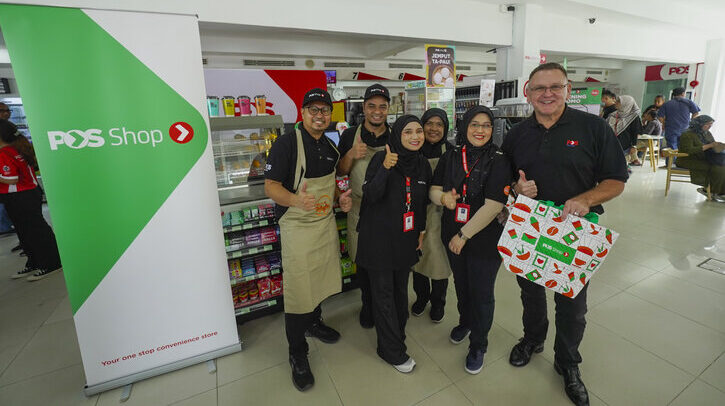
Brewer and the Pos Malaysia digital team have undertaken a ‘mapping’ exercise of available technologies across the different business processes – from billing and marketing to sales, sorting, distribution and last mile – to decide “which ones are commercially available, which are cost-effective or cost-prohibitive, and which ones fit our business strategy”.
“We’ll then invest in available solutions that tick our three strategic boxes – better for our employees, better for our service and customers and better for our finances – and if they don’t tick those then we keep them in the ‘maybe later’ pile,” says Brewer.
Sustainability focus
Moving on from technology, Brewer is keen to highlight some of the major sustainability steps Pos Malaysia is taking.
“When we were developing our transformation strategy we saw sustainability as a key initiative and something we felt was the right thing for us to invest in – we saw that it could create a differentiated position for us with our employees, with our customers, with our stakeholders and, critically, that by doing good for the planet we could also do good for the P&L [profit and loss],” he enthuses.
The post is taking a leading role in reducing emissions in the country and protecting the wide biodiversity Malaysia enjoys, setting an ambitious target of reducing 30% of Scope 1 and 2 emissions and 50% of direct waste by 2025.
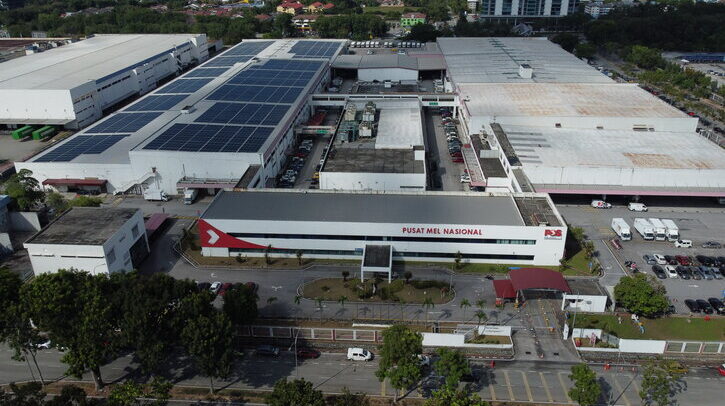
“We have six work streams that we’re focusing on, from fleets and buildings to packaging – and all six have a positive impact on the planet and on our P&L,” Brewer explains. “As an example, the two- and four-wheel electric vehicles we’re investing in are a lower cost than their ICE alternatives; the solar panels we have on our roofs give us a significant saving on our energy bills, and so when we look at what we’re investing in, we’re making sure it’s both fiscally and environmentally sustainable.”
Pos Malaysia is investing in more electric vehicles to hit its 2030 target of a 100% electric fleet. It is rolling out two-wheel e-bikes from Modenas and e-vans from Yinson GreenTech. “By the end of this year, we will have more than 1,300 e-bikes and more than 500 e-vans,” Brewer says. “But it doesn’t stop there: we are in discussion with the relevant Malaysian authorities to introduce electric three-wheel cargo bikes soon – a game-changer for us!”
Other sustainability investments include stripping out the colored ink from recycled packaging and marketing materials, rolling out telematics technologies to understand how to improve vehicle and driver safety and efficiency, reducing waste by banning plastic water bottles and cutting the amount of administrative printing, recycling and repurposing old uniforms, and investing in smart building management systems to control energy use during peak and off-peak operating times.
“We’ve done as many things as we possibly can to reduce the impact we have on the environment, from the smallest to the biggest, including getting rid of photocopiers – much as it upset some of the team. It is about starting new habits. A lot of sustainability is not the difficult stuff, it is just about retraining people to work in a different way.
“And we have been able to do these things in the most positive way to align with our values – good for the planet, good for our people and good for the P&L,” Brewer confirms.
Getting people on board
For Brewer, one of the main challenges of moving forward with Pos Malaysia’s sustainability efforts has been making sure everyone is engaged and “on the bus”, from the posties to senior management and the board. His advice? “Spend a ridiculous amount of time explaining the ‘why’ and listening. Listen to what people think about the change, from the lowest level, because what seems like a fantastic idea to me can be received very differently when it hits the ground.”
When he first took the helm, Brewer says there were no other companies in Malaysia that he could take inspiration from when starting the sustainability transformation, which made things harder. But now, Pos Malaysia is that lighthouse example for others looking to follow suit.
“I’m so proud of our team, what we have achieved and what we will do, but I am equally proud of the fact that the UN Global Compact [the world’s largest corporate sustainability initiative – see UN Global Compact at the end of this article] now has an example in Malaysia that other companies looking to do the same can come and talk to and learn from,” he concludes.
Tips for success
Charles Brewer shares his advice for creating a happy workforce, a sustainable business and a smooth digital transformation
- Ask the right questions – and listen to the answers. “As postal operators, we all face the same opportunities and challenges and yet we don’t operate as a community – we have so much to learn from each other, and together we are so much stronger.”
- Buy-in from the very top is paramount. “The senior management team needs to be fully aligned, not a little or half in but fully in and committed.”
- Knowing when to say no is key. “There are a lot of opportunities that postal operators could get involved in, but you need to be brave enough to say, ‘That’s not for today, that’s for tomorrow’.”
- Just do it. “Just get on and do it because there are plenty of good opportunities for postal operators – we just need to move a lot faster to keep up with our competitors. We need to think faster, act faster and just get on with the job.”
UN Global Compact
The United Nations Global Compact seeks to support companies as they align their practices for a sustainable and inclusive future. With the broad-based support of all 193 participant countries of the United Nations General Assembly, the UN Global Compact remains the single, global normative authority and reference point for action and leadership within a growing global corporate sustainability movement.
The strategy intends to leverage that position and elevate expectations of how businesses will embed all 10 principles of the UN Global Compact into their operations. These principles – covering human rights, labor rights, the environment and anti-corruption – are intrinsic to the sustainability of businesses, people and the planet. They offer companies of all sizes a blueprint for contributing toward achievement of the 2030 Agenda for Sustainable Development and the Paris Agreement.
For more information, visit: unglobalcompact.org
This article was originally published in the September 2024 issue of Parcel and Postal Technology International.


